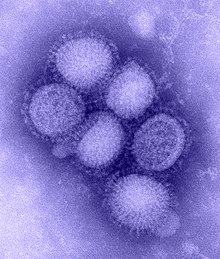Influenza A virus subtype H1N1
subtype of the influenza A virus, with some strains that are swine flue, others avian flue
Influenza A virus subtype H1N1 (A/H1N1) is a type of influenza A virus (IAV). Some human-adapted strains of H1N1 are endemic in humans and are one cause of seasonal influenza (flu).[1]
| Influenza A virus subtype H1N1 | |
|---|---|

| |
| Virus classification | |
| (unranked): | Virus |
| Realm: | Riboviria |
| Kingdom: | Orthornavirae |
| Phylum: | Negarnaviricota |
| Class: | Insthoviricetes |
| Order: | Articulavirales |
| Family: | Orthomyxoviridae |
| Genus: | Alphainfluenzavirus |
| Species: | |
| Serotype: | Influenza A virus subtype H1N1
|
| Strains | |
Other strains of H1N1 are endemic in pigs (swine influenza) and in birds (avian influenza).[2]
Types of IAV are a combination of the antigenic H and N proteins in the viral envelope.[3]
Major outbreaks of H1N1 strains in humans include the 1918 Spanish flu pandemic, the 1977 Russian flu pandemic and the 2009 swine flu pandemic, all of which were caused by strains of A(H1N1) virus which had genetic reassortment.[4]
References
change- ↑ "Influenza A Subtypes and the Species Affected | Seasonal Influenza (Flu) | CDC". Centers for Disease Control and Prevention. 2024-05-13. Retrieved 2024-06-17.
- ↑ Jilani TN, Jamil RT, Siddiqui AH (November 30, 2020). "H1N1 Influenza". H1N1 Influenza in StatPearls. StatPearls. PMID 30020613. Archived from the original on 12 March 2020. Retrieved 25 August 2020.
- ↑ CDC (2024-02-01). "Influenza Type A Viruses". Centers for Disease Control and Prevention. Retrieved 2024-05-03.
- ↑ Clancy, Susan (2008). "Genetics of the Influenza Virus | Learn Science at Scitable". www.nature.com. Nature Education 1(1):83. Retrieved 2024-08-17.